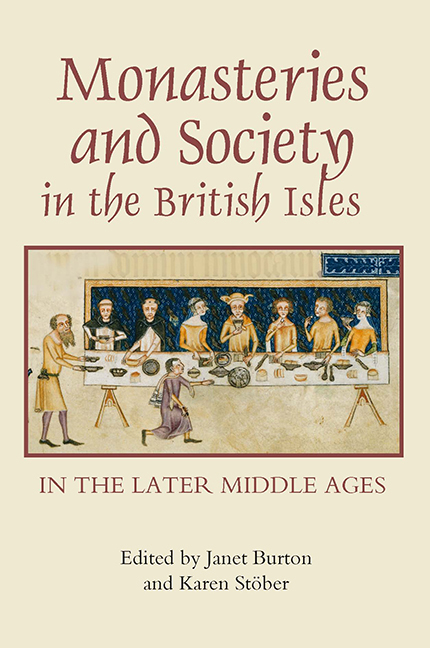Book contents
- Frontmatter
- Contents
- List of illustrations
- Acknowledgements
- List of contributors
- Abbreviations
- Introduction
- The Meeting of the Worlds
- Religious Houses and their Patrons and Benefactors
- Female Communities: Nuns, Abbesses and Prioresses
- Monasteries and Education
- 10 Monasteries and secular education in late medieval England
- 11 ‘Make straight in the desert a highway for our God’: Carthusians and community in late medieval England
- Monasteries and Urban Space
- Religious Houses in the Regions
- Index of Religious Houses mentioned in the text
- Index
- Miscellaneous Endmatter
11 - ‘Make straight in the desert a highway for our God’: Carthusians and community in late medieval England
from Monasteries and Education
Published online by Cambridge University Press: 24 October 2017
- Frontmatter
- Contents
- List of illustrations
- Acknowledgements
- List of contributors
- Abbreviations
- Introduction
- The Meeting of the Worlds
- Religious Houses and their Patrons and Benefactors
- Female Communities: Nuns, Abbesses and Prioresses
- Monasteries and Education
- 10 Monasteries and secular education in late medieval England
- 11 ‘Make straight in the desert a highway for our God’: Carthusians and community in late medieval England
- Monasteries and Urban Space
- Religious Houses in the Regions
- Index of Religious Houses mentioned in the text
- Index
- Miscellaneous Endmatter
Summary
The Carthusians were exceptional among medieval religious in that they were, in theory at least, in business for the salvation of their own souls. Guiges de Saint- Romain, fifth prior of the Grande Chartreuse, who wrote the order's customs before 1133, said that ‘it was not for the temporal cure of other folk's bodies but for the eternal welfare of our own souls that we took refuge in the retirement of this desert’. While that was the reason for discouraging guests and hospitality, a central tenet of Benedictine monasticism, it underlined the separation and exclusiveness that were the Carthusians’ contract with God, symbolised by their withdrawal to desert places. Yet in the later Middle Ages we find that the Carthusians were clearly respected by broad elements of society, supported by princes, and building their monasteries not in the wilderness, but in wellwatered deer parks, on the edges of major towns, or alongside major roads. The order proudly proclaimed that it was nunquam reformata quia nunquam deformata, yet it had changed substantially by the late fourteenth century and was still developing in the early sixteenth century. Henry VIII expected, and desperately needed, the Carthusians to endorse the 1534 Acts of Succession and Supremacy. Their opinion counted with society at large, despite their small numbers – there were only nine Carthusian monasteries out of approximately 836 monastic houses in England and Wales. The priors of London, Axholme and Beauvale died not because they refused to swear the oaths attached to these acts, but because they said it was none of their business to get involved with affairs of state. There is no evidence in 1534 that any Carthusian monk in England opposed the early stages of the Reformation. It was their failure to promote it that destroyed many of them. So how did the Carthusians become so important and influential in the later Middle Ages? By looking at the charterhouses of London and Mount Grace, and particularly the latter, it is possible to reconstruct their relationship with society.
First and foremost was the wish for many people to be buried in a charterhouse, or if that was not possible to be remembered in the monks’ prayers, something which translated specifically into the purchase of obits by the 1480s and confraternity somewhat earlier.
- Type
- Chapter
- Information
- Publisher: Boydell & BrewerPrint publication year: 2008



